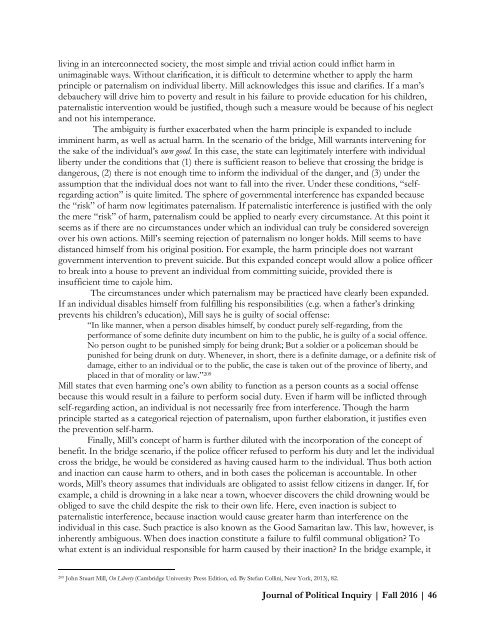Fall2016_Final2
You also want an ePaper? Increase the reach of your titles
YUMPU automatically turns print PDFs into web optimized ePapers that Google loves.
living in an interconnected society, the most simple and trivial action could inflict harm in<br />
unimaginable ways. Without clarification, it is difficult to determine whether to apply the harm<br />
principle or paternalism on individual liberty. Mill acknowledges this issue and clarifies. If a man’s<br />
debauchery will drive him to poverty and result in his failure to provide education for his children,<br />
paternalistic intervention would be justified, though such a measure would be because of his neglect<br />
and not his intemperance.<br />
The ambiguity is further exacerbated when the harm principle is expanded to include<br />
imminent harm, as well as actual harm. In the scenario of the bridge, Mill warrants intervening for<br />
the sake of the individual’s own good. In this case, the state can legitimately interfere with individual<br />
liberty under the conditions that (1) there is sufficient reason to believe that crossing the bridge is<br />
dangerous, (2) there is not enough time to inform the individual of the danger, and (3) under the<br />
assumption that the individual does not want to fall into the river. Under these conditions, “selfregarding<br />
action” is quite limited. The sphere of governmental interference has expanded because<br />
the “risk” of harm now legitimates paternalism. If paternalistic interference is justified with the only<br />
the mere “risk” of harm, paternalism could be applied to nearly every circumstance. At this point it<br />
seems as if there are no circumstances under which an individual can truly be considered sovereign<br />
over his own actions. Mill’s seeming rejection of paternalism no longer holds. Mill seems to have<br />
distanced himself from his original position. For example, the harm principle does not warrant<br />
government intervention to prevent suicide. But this expanded concept would allow a police officer<br />
to break into a house to prevent an individual from committing suicide, provided there is<br />
insufficient time to cajole him.<br />
The circumstances under which paternalism may be practiced have clearly been expanded.<br />
If an individual disables himself from fulfilling his responsibilities (e.g. when a father’s drinking<br />
prevents his children’s education), Mill says he is guilty of social offense:<br />
“In like manner, when a person disables himself, by conduct purely self-regarding, from the<br />
performance of some definite duty incumbent on him to the public, he is guilty of a social offence.<br />
No person ought to be punished simply for being drunk; But a soldier or a policeman should be<br />
punished for being drunk on duty. Whenever, in short, there is a definite damage, or a definite risk of<br />
damage, either to an individual or to the public, the case is taken out of the province of liberty, and<br />
placed in that of morality or law.” 209<br />
Mill states that even harming one’s own ability to function as a person counts as a social offense<br />
because this would result in a failure to perform social duty. Even if harm will be inflicted through<br />
self-regarding action, an individual is not necessarily free from interference. Though the harm<br />
principle started as a categorical rejection of paternalism, upon further elaboration, it justifies even<br />
the prevention self-harm.<br />
Finally, Mill’s concept of harm is further diluted with the incorporation of the concept of<br />
benefit. In the bridge scenario, if the police officer refused to perform his duty and let the individual<br />
cross the bridge, he would be considered as having caused harm to the individual. Thus both action<br />
and inaction can cause harm to others, and in both cases the policeman is accountable. In other<br />
words, Mill’s theory assumes that individuals are obligated to assist fellow citizens in danger. If, for<br />
example, a child is drowning in a lake near a town, whoever discovers the child drowning would be<br />
obliged to save the child despite the risk to their own life. Here, even inaction is subject to<br />
paternalistic interference, because inaction would cause greater harm than interference on the<br />
individual in this case. Such practice is also known as the Good Samaritan law. This law, however, is<br />
inherently ambiguous. When does inaction constitute a failure to fulfil communal obligation? To<br />
what extent is an individual responsible for harm caused by their inaction? In the bridge example, it<br />
209<br />
John Stuart Mill, On Liberty (Cambridge University Press Edition, ed. By Stefan Collini, New York, 2013), 82.<br />
Journal of Political Inquiry | Fall 2016 | 46
















